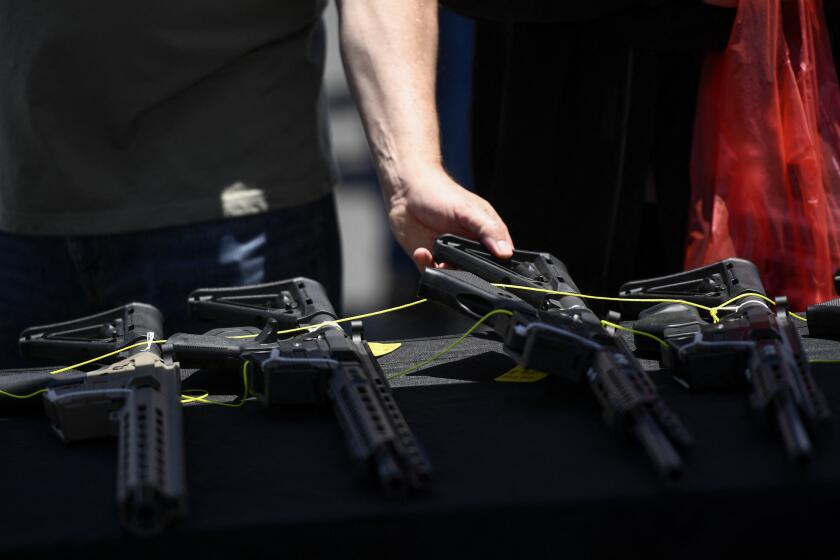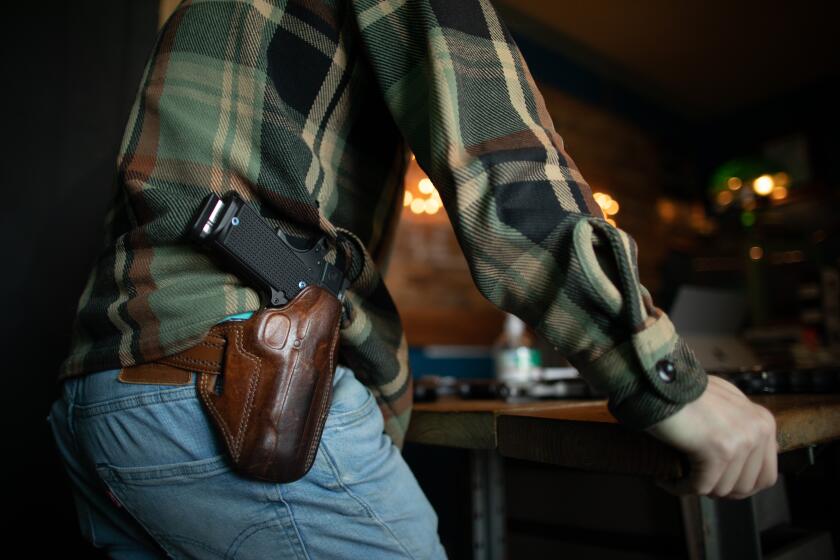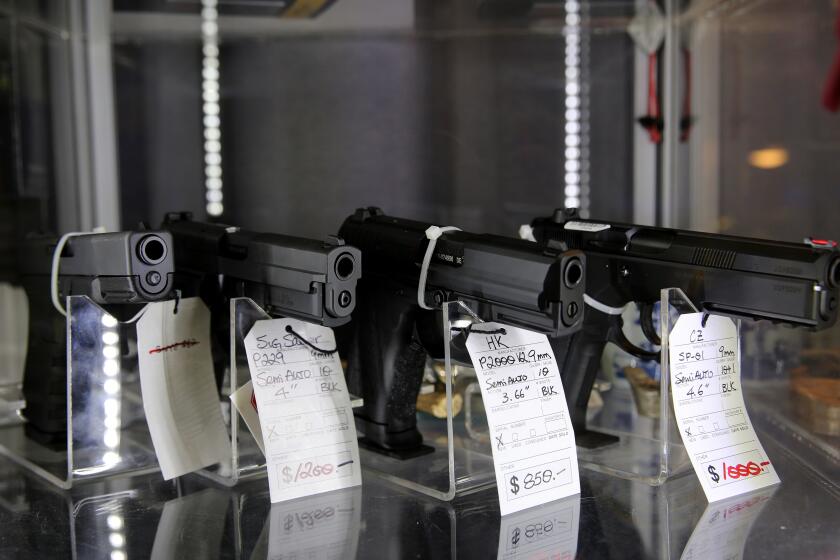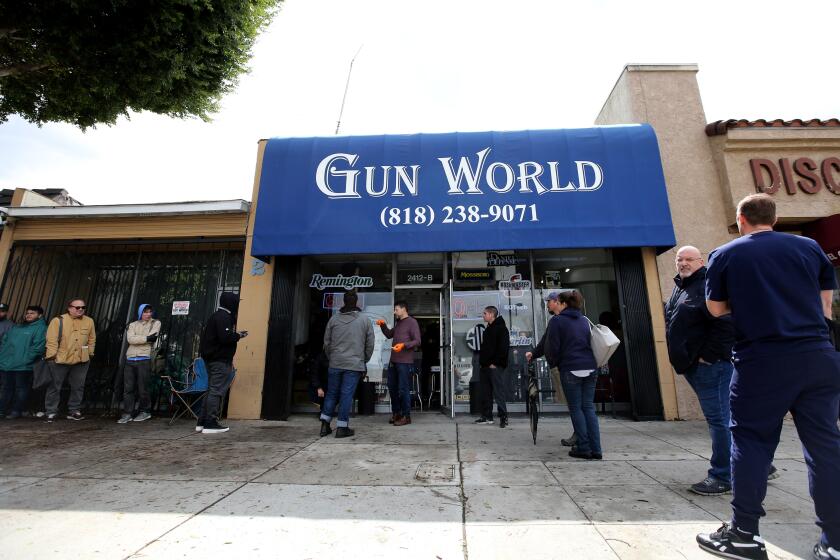Newsom signs gun laws that add new taxes and limit where owners can carry firearms
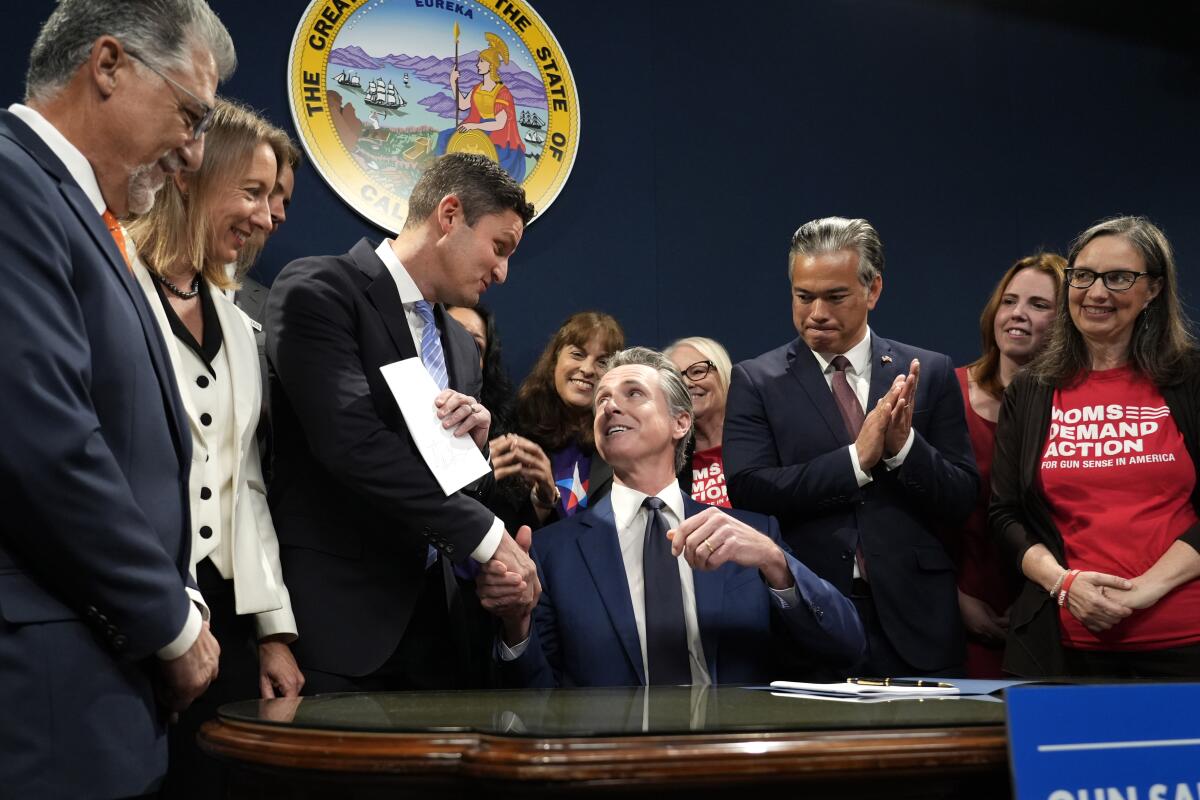
- Share via
California Gov. Gavin Newsom signed several gun control measures Tuesday, including a bill that tightens the state’s concealed-carry rules and another that imposes a new tax on firearm and ammunition sales.
During a signing ceremony in Sacramento alongside lawmakers and gun control advocates, Newsom said California would resist legal efforts to dismantle its firearms laws and maintain its position as a national gun control leader, but called for greater federal action.
“We have a responsibility to do more and continue to lead in that conversation,” Newsom said. “I think we need to be screaming louder about this.”
“I’m celebratory, because I’m proud that we were able to sign these bills,” he added, “but it’s going to require a national construct, a national frame in order to ultimately address this.”
The laws build on Newsom’s resolution that the Legislature passed earlier this month calling for a constitutional convention of the states to consider a new amendment on gun control.
Gov. Gavin Newsom’s call for states to pass national gun control measures remains a long shot but has boosted his political profile in the U.S. culture wars between Democrats and Republicans.
California has some of the strongest firearm restrictions in the country, each year earning top marks from gun control advocacy organizations such as the Giffords Law Center. Nonetheless, guns have contributed to an uptick in California’s violent crime rates over the last several years, according to an analysis by the nonpartisan Public Policy Institute of California.
Also hanging over the celebration were the two mass shootings at the start of the year in Monterey Park and Half Moon Bay that killed 18 people and increased pressure for additional legislation to regulate firearms.
Of the more than 20 bills Newsom signed, two stand out as especially significant.
Senate Bill 2 is California’s response to the U.S. Supreme Court ruling in New York State Rifle & Pistol Assn. vs. Bruen last year, when the 6-3 conservative majority struck down restrictive concealed-carry laws as unconstitutional.
The decision forced Newsom, Atty. Gen. Rob Bonta and Democratic lawmakers, including state Sen. Anthony Portantino (D-Burbank), to write legislation that would scrap California’s more subjective law that allowed local authorities to decide who can get a concealed-carry permit and replace it with a policy that largely guarantees a license once application criteria is met.
Democrats send Gov. Gavin Newsom a bill to restrict who can obtain a concealed-carry permit in California, teeing up a possible Supreme Court fight.
Despite the changes, the new law still seriously limits who can obtain a license to carry a concealed firearm and is already facing a legal challenge from gun rights advocates.
It details more than two dozen “sensitive places” that are off-limits to firearms, such as child care centers and schools, public transit, banks, museums, zoos, medical facilities, parks, playgrounds and bars. The bill also includes a controversial provision that renders commercial businesses gun-free zones unless the owner explicitly says otherwise.
Licensing authorities, namely sheriff’s departments, will now be required to conduct in-person interviews with applicants, request character references and review publicly available statements such as social media posts to determine whether someone is a public safety risk and therefore a “disqualified” person. The law also increases training and safety storage rules and requires concealed-carry applicants to be 21, the same age required in California to buy a handgun.
“Raising the minimum age to carry concealed firearms and creating sensitive place restrictions will ensure that our communities and families are more protected from gun violence in public locations,” Kris Brown, president of Brady: United Against Gun Violence, said in a statement. “This is all the more vital following last year’s disastrous Supreme Court decision in Bruen.”
California legislators modeled SB 2 after a similar New York law that’s ensnared in legal challenges likely to wind up back at the Supreme Court.
California Democrats approved a bill on Thursday to add an 11% excise tax on firearms manufacturers and dealers to help fund violence prevention programs and to bolster school safety.
Hours after the state Legislature approved SB 2, gun rights groups preemptively filed a lawsuit to block its implementation, arguing that it still contained subjective licensing criteria at odds with the Bruen decision and that the number of sensitive places on the list is unconstitutional.
“SB 2 creates a patchwork quilt of locations where Second Amendment rights may and may not be exercised, thus making exercise of the right so impractical and legally risky in practice that ordinary citizens will be deterred from even attempting to exercise their rights in the first place,” the legal filing claims.
Speaking at the signing event in Sacramento, Bonta shrugged off those arguments and said that SB 2 is “Bruen compliant” and “follows the blueprint” of the decision.
Portantino also said California could make a “compelling argument” in defense of every banned place on the list.
“It’s a responsibility,” Portantino said. “So I don’t have a problem with saying to that community that believes in having a concealed-carry permit that they have to do a little work” to determine where they are allowed to carry their concealed weapons.
The second major proposal Newsom signed is Assembly Bill 28, landmark legislation by Assemblymember Jesse Gabriel (D-Encino) that will impose an 11% tax on dealers and manufacturers for sales of guns and ammunition. The new law is expected to raise more than $160 million annually for violence prevention, school safety programs and victim support services.
Opponents of AB 28 expanded beyond the 2nd Amendment advocacy organizations that typically fight California’s firearms laws to include wildlife, conservation and hunting groups concerned that lawful gun owners would bear the tax burden. They argued that hunting and shooting sports would become unaffordable to low-income communities and that the new law would discourage outdoor recreation.
“AB 28 would unjustifiably place the entire burden of funding efforts to address illegal gun violence on the backs of law-abiding citizens who legally purchase and lawfully use firearms and ammunition,” the California Rifle & Pistol Assn. wrote in opposition to the bill.
Newsom has previously said he was not interested in new taxes, and supporters of AB 28 had braced themselves for a veto.
But a coalition of more than 100 gun safety groups lobbied Newsom’s office in recent weeks to sign the bill, arguing in one letter that AB 28 would help “cement” his legacy as a “national champion on this issue” while highlighting how the money would be used to bolster some of California’s most effective violence-prevention programs.
Newsom said that he saw the new gun tax through a different lens than a general income tax and that the money would be used for important services and programs.
“I think this is a pretty modest investment in prevention,” he said.
A California bill would ban lotteries, raffles and other promotional events at gun stores and add new misdemeanors to a list of crimes that prohibit firearm ownership for 10 years.
“With this historic legislation, these programs will have permanent funding and California will continue to be an undisputed leader in the fight for gun safety, paving the way for innovative, effective methods of reducing gun violence,” Paul Carrillo, vice president of the Giffords Center for Violence Intervention, said in a statement. “This law will save many, many lives in the years to come and provide a sustainable funding stream for proven programs to prevent community violence.”
The new tax law will take effect on July 1, 2024.
Other bills Newsom signed will:
- Restrict firearms dealers from holding certain game-style promotional events such as lotteries and raffles and create an opportunity for gun owners in a mental health crisis to store their weapons with dealers.
- Prohibit licensed firearm dealers from selling semiautomatic pistols without microstamping verification, beginning in 2028.
- Prohibit certain people in pretrial mental health diversion from owning a firearm until they complete the program.
- Reduce how much time someone convicted of a crime has to hand in their firearms.
- Bar someone from buying or owning body armor, often used by mass shooters, if they’re also banned from owning guns.
- Crack down on unserialized firearms, or so-called ghost guns, and the 3-D printers used to make them.
More to Read
Sign up for Essential California
The most important California stories and recommendations in your inbox every morning.
You may occasionally receive promotional content from the Los Angeles Times.
